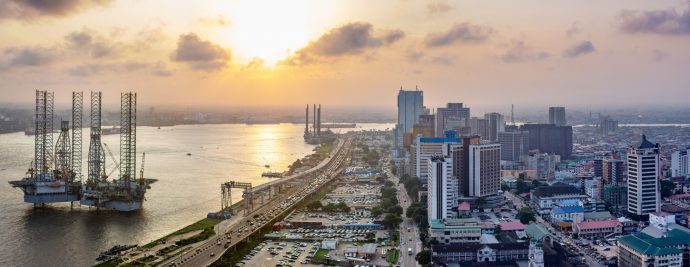Oil has dominated Nigeria’s international trade since exploration opened up to foreign investors more than half a century ago. But now it is looking to diversify its economy by developing other sectors – and GAC is poised to support that growth.
Nigeria was the first African nation to join the Organisation of the Petroleum Exporting Countries (OPEC) in 1971 and, in 1977, the Nigerian National Petroleum Company (NNPC) was founded. It remains the continent’s main oil producer and the world’s ninth largest exporter of crude petroleum, exporting USD$52.1 billion worth of the product (91% of its liquid cargo exports) in 2022.

While global efforts to transition from fossil fuels to alternative energy sources continue, worldwide demand for power is on the rise. As a result, Nigeria’s petroleum exports look set to increase further.
Domestic refining giant
To help meet that demand, the country’s first domestic petroleum refinery is being built at Lekki, east of Lagos, and is due to become fully operational by mid-2025.
At a cost of more than US$19 billion and covering the size of more than 4,000 football fields, the Dangote Refinery is set to redefine Nigeria as an oil exporting juggernaut.
“Refined products such as gasoline, diesel, aviation fuel from the Dangote Refinery will be in high demand,” says Johan Thuresson, GAC Nigeria’s Managing Director. “While some will help meet growing domestic demand, most will be exported. As a result, the tanker market will become busier as bigger and a greater number of vessels access Nigeria’s major ports.

“All of this is good news for GAC Nigeria, which is a well-established and experienced player in the West African tanker market.”
Infrastructure upgrade
The country is working to improve its infrastructure to support the influx of vessels and trucks the new refinery will bring. The Lekki Deep Sea Port, which was inaugurated in January 2023 as Nigeria’s first deep sea port, is a clear example of how the nation is promoting trade and commerce, attracting investment and improving its maritime credentials. New highways, railways and aviation networks are also expected to be built as a direct result of the refinery’s development.
“GAC Nigeria is staking its claim in the country’s future supporting such development by showcasing our well-established credentials as a leading provider of shipping, logistics and marine services at the country’s ports and oil & gas installations,” adds Johan.
New ventures
All this development will dramatically impact Nigeria’s shipping and logistics sectors as they look to cater to the increased demand and ensure vital infrastructure is in place to support the influx of new cargo movement.
The country’s freight and logistics market is segmented by industry (agriculture, fishing and forestry, construction, manufacturing, oil and gas, mining, and quarrying, wholesale and retail trade, others). An estimated USD10.2 billion worth of goods is expected to have been imported to and exported from the country this year. That market value is forecast to grow to US$15.05 billion by 2030.
According to data released by Nigeria’s National Bureau of Statistics, in the first quarter of 2024, more than US$3 billion worth of agricultural, solid materials and raw material goods were imported, while more than US$1.87 billion of the same cargoes were exported in the same quarter. Showcasing the importance of Nigeria’s growing agricultural sector, in comparison to the previous quarter, agricultural goods exports rose 123.08%.
The rise of e-commerce has been another driver of growth in logistics activity. In 2023, the Nigerian e-commerce market generated US$6.7 billion in revenue and is expected to reach a market volume of around US$10.1 billion by 2027 as its rail and road networks are upgraded and relations with other nations improve.
Dedicated depot
As a result, Nigeria’s container ship market is also showing significant activity. In 2023, 1.57 million TEUs of containers were transported through its ports. And while that figure is slightly down from 2022’s 1.68 million TEUs, the sector is expected to recover.
In anticipation of growing container traffic and the expected stabilisation of the market, GAC Nigeria has set up its own dedicated Inland Container Depot (ICD) in Lagos to handle containers coming off hire from shipping lines. This also aimed to avoid issues caused by congestion at ports. The company is also focusing on handling dry cargo and breakbulk shipments.
“Although GAC has historically been a tanker agent in Nigeria, we recognised the need to be open to other businesses,” says Johan. “We see a lot of dry cargo and breakbulk vessels carrying everything from steel plates to cars and buses, truck heads, wood and more. We want to attract these vessels.
“The establishment of our ICD was a logical step to expand our range of services and offerings, catering to other cargoes and customers while never compromising on quality of service or experience.”

By continuing to innovate and improve the ways it does business as a ship agent, as a logistics provider, through its recruitment arm GMS Recruitment Services, and in our core sectors and beyond, GAC Nigeria is claiming a key role in the country’s next chapter.